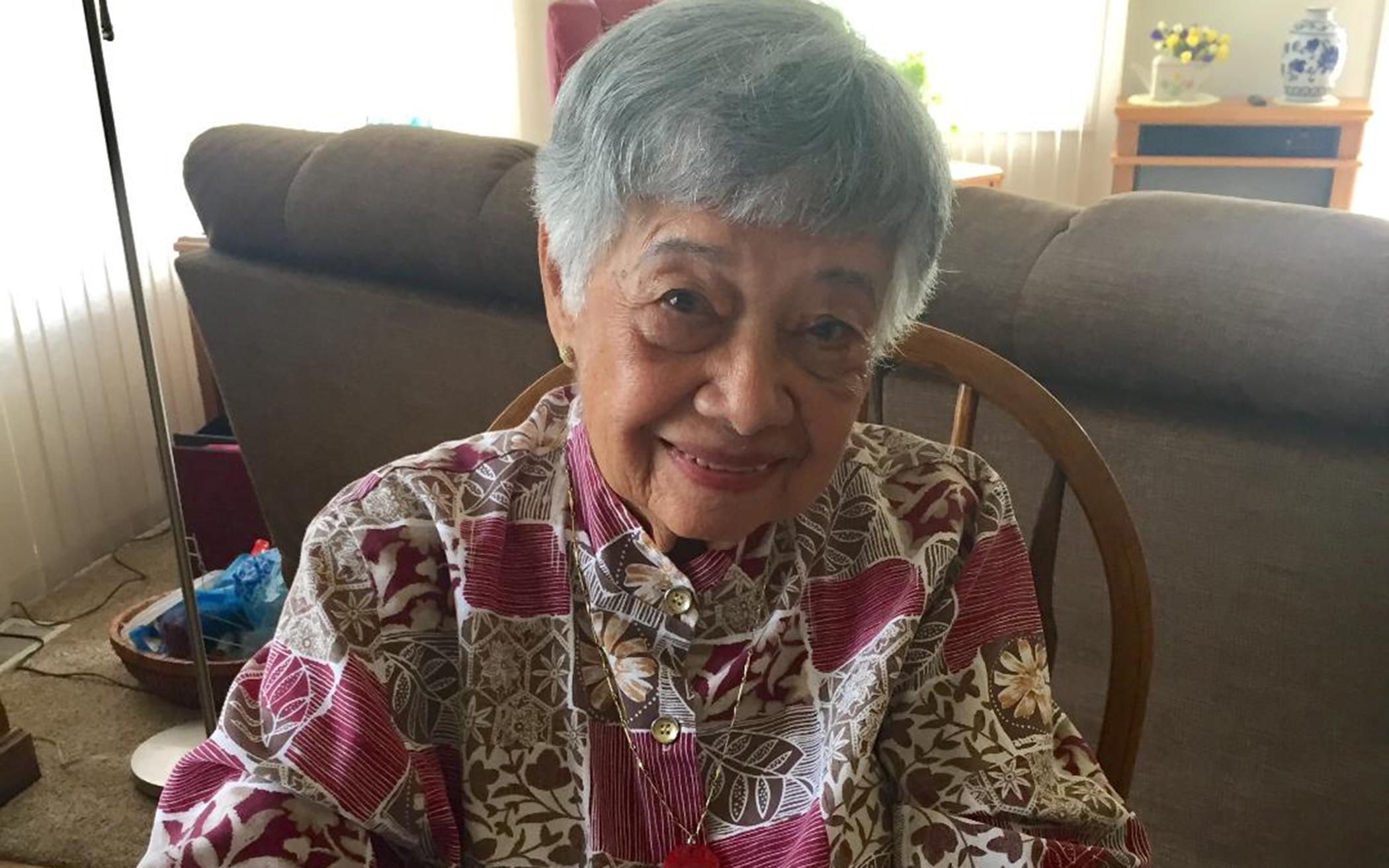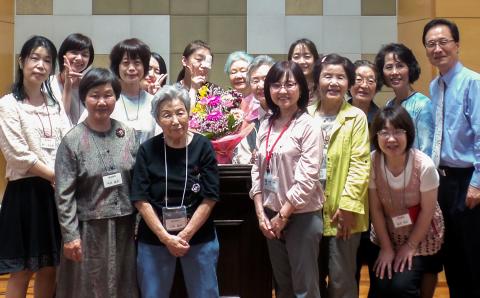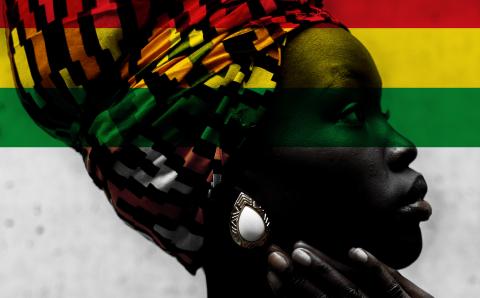After almost a century of survival, “I’m still here,” Theodora Kleisma often tells people. And no one is more surprised than she is.
Her story dates back more than 350 years to the Spice Islands of the Indonesian archipelago and the wars that erupted over their control. In 1602, the Dutch established the Dutch East India Company, which led to the government of the Netherlands establishing the Dutch East Indies—present day Indonesia—as a nationalized colony.
Kleisma is descended from Indos, a mixture of native Indonesians and Dutch colonist settlers. Her life has had “plenty of spice and too much war.”
Theodora Franscisca Johanzoon was born March 27, 1926, on the island of Sumatra, famous for its coffee and tigers. Known in ancient times as the “Island of Gold” for its gold deposits, her homeland has always been an exotic place of adventure and wildness.
Four years before her birth, Theodora’s older brother, Gustaaf, died of pneumonia at 10 months old. Her father, Emile, always believed in the power of prayer and prayed fervently for another child, because it seemed as if her mother could not get pregnant again after Gustaaf died.
“If you answer my prayer, and give us a child, I will honor you in his or her name,” her father prayed. He had already chosen names: Theodore for a boy and Theodora for a girl, because both names mean “gift of God.”
During World War II, Theodora’s clashing bloodlines meant the teenager would see far more tragedy, violence, and injustice than anyone should ever see. She would lose her father, who meant everything to her. This loss would stay with her for the rest of her life.
“But God was working,” she says in her memoir, Theodora: How I Survived a WW2 Japanese Prison Camp, Fled Indonesian Extremists, and Escaped the Great Dutch Flood. “He was bringing good out of bad and planting seeds of hope in my darkest hours.”
Through all the tragedy, she would remember her father, an itinerant evangelist, counseling, “If you don’t know how to pray, you just need to know one word: ‘Help!’ Pray ‘Lord, help me.’” Theodora would need tremendous help in the next phase of her life.
World War II
On March 9, 1942, Japanese forces took control of Indonesia. Indo-Europeans with more than 50% Dutch blood would be sent to concentration camps, including 16-year-old Theodora and her family. Her beloved dad was one of the first to be taken to a prison labor camp.
The just-captured prisoners of war were marched out in front of Theodora and her mother.
“Pappi, Pappi!” she cried out. A Japanese soldier took pity and allowed her father to break from the troops to say goodbye. Emile kissed her mother and told her, “Take good care of my two diamonds,” meaning Theodora and her sister, Toot. “Did he know then he would never see us again?” Theodora wondered. He was about to suffer terrible cruelty and deprivations, and he died soon after his capture.
Theodora, her mother, her sister, and her 10-year-old brother, Ed, were sent to Halmaheira, a detention camp that housed almost 4,000 women and young boys. Here they battled disease, infestations, and near-starvation. They subsisted on rice, mush, bats, slugs, and laundry starch. The inmates were always on the lookout for animals to kill and eat. At one point, Theodora spotted an older woman, a server at the camp, crying.
“Why are you crying?” someone asked.
“I have to kill my dog,” the woman replied, weeping.
The Japanese soldiers told her she had to kill her pet and then serve it to the others to eat. “It was one of the worst things I have ever seen,” Theodora said. “I’ll never forget when this devastated old lady scooped up a bit of ragout, made from her dog, and slopped it on my plate.”
After Japan surrendered more than three years later, in August of 1945, Theodora and her family were released. But as Indos, she remembered, “our celebration was short lived.” Her people group suffered racism and violence from Indonesian extremists.
It was also difficult to move on without Emile. The Allies were working hard to reunite prisoners from men’s camps with those from the women’s camps. One of the hardest things for Theodora was witnessing the joyous and tender reunions of other girls and their fathers. “My heart was broken to know I would never see my father again on this earth,” she said.
After the War
Theodora traveled to Thailand, where she met her first husband, a fellow Indo, and started a family with him back in their volatile homeland. The Indonesian struggle for independence would go on for four years, with untold lives lost on both sides. At age 24, by then a mother of three young children, Theodora received death threats. “Get out now, or else,” the letters said. “We have a tree picked out to hang all of you on it.”
Fleeing her home in a military convoy traveling through the jungle, Theodora and her family were shot at by extremists but eventually reached safety. They boarded a ship bound for the Netherlands, filled with relief but also some anxiety about the unknown.
Having repatriated to the Netherlands, Theodora’s life would be plunged into grave danger again on the morning of Feb. 1, 1953. During the Great Dutch Flood, the family’s first-floor windows in Kruiningen, Zeeland, shattered and water poured inside. Scurrying to the attic with her four children, Theodora dropped each of them out the window into the arms of rescuers in boats. A third time Theodora survived, but her life would hold still more hardship.
When she was in her early 30s, as a new immigrant in Grand Rapids, Mich., Theodora’s first husband would betray her and, along with his new wife, swindle her for custody of their seven children. Broken and vulnerable, a stranger in a new land, Theodora leaned on supportive friends who would teach her the beauty business in which she would thrive. She remarried and moved to California, where she worked as a beautician and massage therapist. But a mother never forgets her children. Though she was not allowed to contact them, Theodora waited, wept in secret, and prayed. It would be decades before she was able to reestablish contact with her children and grandchildren, something that still haunts them all.
Today she is reconciled with her family and attends Madison Square Church in Grand Rapids with two of her daughters.
The prayer her father taught her has stood her in good stead. “I remember how it feels to lose everything,” she said. “Always pray, even if all you can say is ‘God help me!’ He always will.”
At age 93, Theodora keeps a framed photo of handsome Emile, a twin to her grandson Theodore, on her bedside table. “It’s been 74 years since my father hugged me goodbye,” she said. “I feel close to him and know that I will join him and my mother sooner rather than later in heaven. What a joyful reunion we will experience!”
Theodora’s memoir is available at Schuler Books in Grand Rapids, Mich., and on Amazon.com.
About the Author
Lorilee Craker, a native of Winnipeg, Man., lives in Grand Rapids, Mich. The author of 16 books, she is the Mixed Media editor of The Banner. Her latest book is called Eat Like a Heroine: Nourish and Flourish With Bookish Stars From Anne of Green Gables to Zora Neale Hurston.








